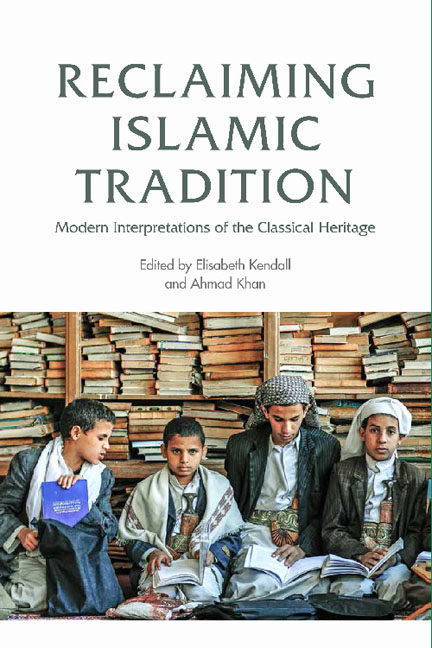Book contents
- Frontmatter
- Contents
- Acknowledgements
- About the Contributors
- Introduction
- 1 Modern Shiʿite Legal Theory and the Classical Tradition
- 2 Muḥammad Nāṣīr al-Dīn al-Albānī and Traditional Hadith Criticism
- 3 Islamic Tradition in an Age of Print: Editing, Printing and Publishing the Classical Heritage
- 4 Reaching into the Obscure Past: The Islamic Legal Heritage and Reform in the Modern Period
- 5 Reading Sūrat al-Anʿām with Muḥammad Rashīd Riḍā and Sayyid Quṣb
- 6 Contemporary Iranian Interpretations of the Qurʾan and Tradition on Women’s Testimony
- 7 Ibn Taymiyya Between Moderation and Radicalism
- 8 The Impact of a Sixteenth-Century Jihad Treatise on Colonial and Modern India
- 9 Jihadist Propaganda and its Exploitation of the Arab Poetic Tradition
- 10 Contemporary Salafi Literature on Paradise and Hell: The Case of ʿUmar Sulaymān al-Ashqar
- Index
Introduction
Published online by Cambridge University Press: 11 November 2020
- Frontmatter
- Contents
- Acknowledgements
- About the Contributors
- Introduction
- 1 Modern Shiʿite Legal Theory and the Classical Tradition
- 2 Muḥammad Nāṣīr al-Dīn al-Albānī and Traditional Hadith Criticism
- 3 Islamic Tradition in an Age of Print: Editing, Printing and Publishing the Classical Heritage
- 4 Reaching into the Obscure Past: The Islamic Legal Heritage and Reform in the Modern Period
- 5 Reading Sūrat al-Anʿām with Muḥammad Rashīd Riḍā and Sayyid Quṣb
- 6 Contemporary Iranian Interpretations of the Qurʾan and Tradition on Women’s Testimony
- 7 Ibn Taymiyya Between Moderation and Radicalism
- 8 The Impact of a Sixteenth-Century Jihad Treatise on Colonial and Modern India
- 9 Jihadist Propaganda and its Exploitation of the Arab Poetic Tradition
- 10 Contemporary Salafi Literature on Paradise and Hell: The Case of ʿUmar Sulaymān al-Ashqar
- Index
Summary
Men make their own history, but they do not make it as they please; they do not make it under self-selected circumstances, but under circumstances existing already, given and transmitted from the past. The tradition of all dead generations weighs like a nightmare on the brains of the living. And just as they seem to be occupied with revolutionizing themselves and things, creating something that did not exist before, precisely in such epochs of revolutionary crisis they anxiously conjure up the spirits of the past to their service, borrowing from them names, battle slogans, and costumes in order to present this new scene in world history in time-honored disguise and borrowed language. Thus Luther put on the mask of the Apostle Paul …
Karl Marx (1954)The notion of tradition is a powerful one for historians of Islam and Islamic societies, although they probably would not describe its burden in such morbid terms as does Marx. Events in the modern period have catapulted the Islamic tradition well beyond the confines of academic scholarship and into the public sphere, where aspects of the Islamic tradition have acquired a new potency in political, social, economic and religious life. Recent events in the Islamic world have also provoked new interpretations of the Islamic tradition by movements and intellectuals in countries as diverse as Iran, India, Saudi Arabia, Egypt and Yemen, all of which feature in this volume. A fascinating range of modern Islamic movements and intellectuals has sought to reinterpret certain rulings, inherited texts, concepts, ideas, genres, persons, events and trends from the Islamic tradition.
Despite this contemporary alacrity over the Islamic tradition, careful treatments of the Islamic tradition in its longue dureé perspective have been few and far between. There is good reason for this tardiness. The Islamic tradition represents a vast corpus of texts, ideas and practices expressed in a variety of languages and whose geographical range is limited neither to the Middle East nor to the Global South. No one book can encompass the complex diversity that constitutes the Islamic tradition and no one scholar can survey its entire literary heritage. Yet, its very breadth demands a careful examination of how modern thinkers, scholars and movements have navigated the contours of the Islamic tradition in the modern period.
- Type
- Chapter
- Information
- Reclaiming Islamic TraditionModern Interpretations of the Classical Heritage, pp. 1 - 11Publisher: Edinburgh University PressPrint publication year: 2018

